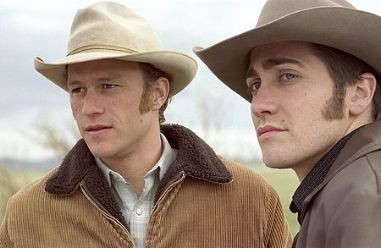Heartbreak mountain

After the world premiere of Brokeback Mountain at the Venice Film Festival, where it won the award for Best Picture, the publicity machines began referring to it as “the gay cowboy movie.” That tag line changed once people got a chance to see the film. Now it is being called one of the best love stories Hollywood has turned out in a long while.
It’s the tale of a 20-year relationship between two men, a laconic ranch hand with the mellifluous name of Ennis Del Mar (Heath Ledger) and a cut-rate rodeo rider named Jack Twist (Jake Gyllenhaal). They meet and fall in love in the summer of 1963 while working as sheep herders on Brokeback Mountain in Wyoming. Knowledge of their love for each other sneaks up slowly on the audience and the main characters alike, culminating in an explosion of passion on a freezing night inside a cramped pup tent. The passion is intense, since they have been holding back their feelings for so long, and violent, as they wrestle with their terrifying sexual desires.
After a few blissful weeks on the mountain, which is their private Eden, the job ends and the men must trudge back to their regular lives. There is no talk of going off together or moving to San Francisco. This is the macho west of the 1960s, where a gay cowboy equals a dead cowboy.
But their love for each other proves to be more potent than they realize. After a four-year hiatus, during which both men marry and have children, Jack drops Ennis a postcard, comes to visit him in Texas, and soon becomes his “old fishing buddy,” with whom he goes on fishing trips two or three times a year. Or at least that’s what Ennis and Jack tell their wives and families.
The drama of the story stems from the willingness of one man (Jack) to give their risky relationship a chance, figuring—perhaps a bit naively—that their love should be enough to make it work against all odds. Ennis, on the other hand, is convinced that it can never work. His skepticism comes, at least in part, from a gruesome childhood memory (seen in flashback) that still serves as a warped life lesson decades later.
Without Jack’s love, Ennis’s life is rudderless. He is a distant husband, an unreliable father, a slipshod employee and a confused lover. Frustration leads to anger and resentment, until the tragic element inherent in almost all stories of unattainable love pushes to the surface.
Brokeback Mountain is based on a 1997 short story by Annie Proulx (The Shipping News) that first appeared in the New Yorker. Western writer Larry McMurtry (Lonesome Dove) turned it into a movie script with the help of his writing partner, Diana Ossana. For seven years, it bounced around screenplay limbo, heralded as one of the great “unproduced screenplays” that no one had the courage to make. It was rescued by Taiwanese director Ang Lee (Crouching Tiger, Hidden Dragon), who embraced the story and spooled it off with precision and care.
Lee is helped greatly by a pair of Latin Americans: cinematographer Rodrigo Prieto (Amores Perros), who captures the stunning beauty of the natural world where Ennis and Jack’s love is able to flourish (most of the exterior scenes were shot in Canada), and composer Gustavo Santaolalla (The Motorcycle Diaries), whose simple guitar riffs provide a perfect counterpoint to the complex feelings of the two men.
The acting is strong and understated across the board. Special mention must go to Ledger. One would never guess that this burgeoning sex idol, who has turned out one mediocre picture after the other in recent years, had such a heartbreaking performance inside him. It is Ennis’s unwillingness to accept who he is and what he has been given that drives the story forward.
When Ledger, as Ennis, gazes at a postcard of Brokeback Mountain late in the film, I thought of Heathcliff staring out at the moor in Wuthering Heights—an awfully high level of comparison for any love story. As a movie about the ways that love can both define and destroy lives, Brokeback Mountain is a stunning piece of work.





